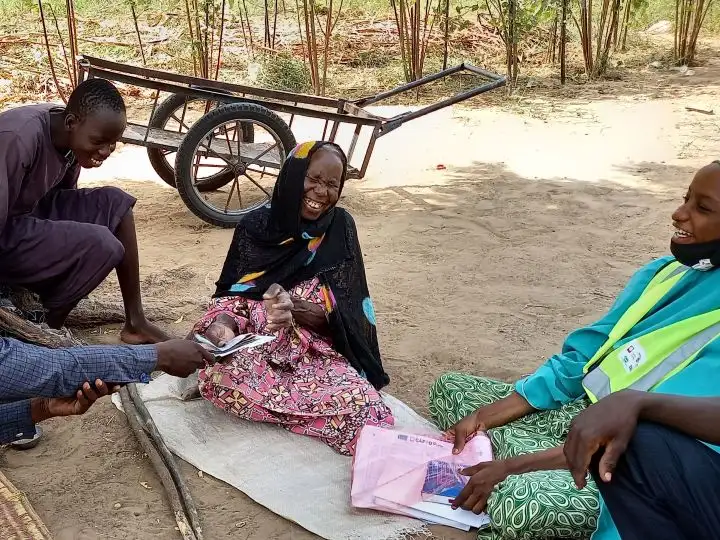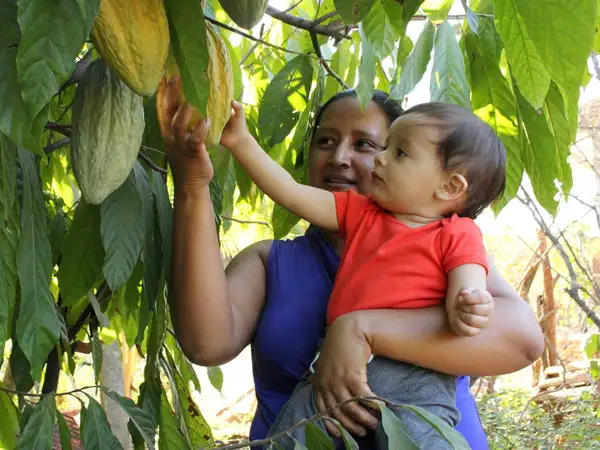

Cash assistance for conflict-affected families in Nigeria
Despite being Africa’s largest economy, Nigeria still faces big development challenges: political unrest, conflict and climate disasters like floods and heat waves.
The country’s population is growing rapidly. This is having an impact on the environment, with alarming levels of deforestation and pollution. Coupled with poor government policies, jobs are increasingly scarce and poverty remains widespread: Nigeria’s poverty rate reached 38.9 per cent in 2023, with an estimated 87 million Nigerians living below the poverty line (the world’s second-largest poor population).
Unequal access to education, healthcare and electricity limits opportunities for many citizens. Regional instability across West Africa, breakdown of law and order, and the growth of violent extremism and terrorism have made the situation so much worse – especially for women and girls.
A better world needs all of us. That’s why CAFOD has been working alongside local experts in Nigeria since the 1960s to fight inequality, build peace and provide practical help during emergencies.
Our impact in 2024
In 2024 we reached 19,693 people in Nigeria.
We helped to increase women’s representation in governance and decision-making processes by 24 per cent.
We reached over 5,000 households with a new, innovative and eco-friendly cooking fuel (briquettes made from farm waste).
We worked with 838 people in conflict-affected areas of Plateau State to encourage peace and inclusivity.
Why CAFOD works in Nigeria
Even though the structures, policies, and systems are in place, there remains a lack of accountability across many parts of Nigeria’s governance. Corruption and abuse are going unpunished – people don’t trust the government because it fails to protect lives, jobs and property, deepening social and economic struggles – and the most vulnerable people in society are left without protection, unable to hold their leaders to account.
With youth unemployment at 68 per cent – the highest unemployment rate in Africa – many are struggling to provide for their families. A weak education system and rising living costs are pushing more people into poverty.
Nigeria continues to experience food insecurity, with 33 million people expected to be facing dangerous levels of hunger in 2025. Food security is dependent on smallholder subsistence farming (when farmers grow crops and raise animals to feed their families, with little or no food left over to sell) which is unreliable – especially with increasingly unstable weather caused by the climate crisis.
Despite the numerous government programmes to improve the livelihoods of smallholder farmers, the situation remains dire.
Finally, division and conflict across ethnic and religious lines remains a growing trend: diverse groups are feeling inadequately represented in national decision-making processes and misinterpretation of religious practices are adding to tensions, which can sometimes escalate into conflict. Unfortunately, women and girls are often the most vulnerable to harmful religious practices.
How we’re responding
Together, we can build a better world. Donations from you can make sure that no one in Nigeria has their life limited by injustice or poverty – that everyone has the support they need to flourish.
Local partners in Nigeria are working on projects to: empower women and girls; seek justice, peace and good governance; and build resilient communities.
Current projects
We are challenging male-dominated cultural, religious, legal and economic structures that reinforce unequal power relations. All of our work in Nigeria seeks to protect the rights of women and girls, provide psychosocial support to survivors of gender-based violence (GBV), and support the economic empowerment of women and girls through business and livelihood.
We established a rice mill in Kogi state, supporting over 1,000 women. During the building of the rice mill, women in Kogi state were for the first time elected into parliament (one in the senate, two in the state house of assembly and 45 into the local government legislative councils).
We’re advocating for policies that promote peaceful coexistence and the right to religious beliefs. We’re planting trees with communities to build social cohesion and to benefit the environment. We’re focusing on improving transparency, accountability and participation of women and young people in the democratic process by creating platforms for engagement with local government officials. Community leadership structures that thrive on the inclusion of women will be strengthened and we are opposing all forms of negative religious and cultural biases.
We are prioritising environmentally friendly livelihood opportunities to help people adapt to the climate crisis. We are working with pastoralist communities to find ways to blend traditional farming methods with new technologies so their hard work can adapt to the rapidly changing climate. We are introducing the use of farm waste in the production of fuel for cooking (briquettes) and championing renewable energy sources. So far, we’ve reached over 5,000 households.

What we do
CAFOD is the official aid agency for the Catholic Church in England and Wales.
With your help, we reach out to people living in hard-to-reach places, in war zones and those who are discriminated against.

